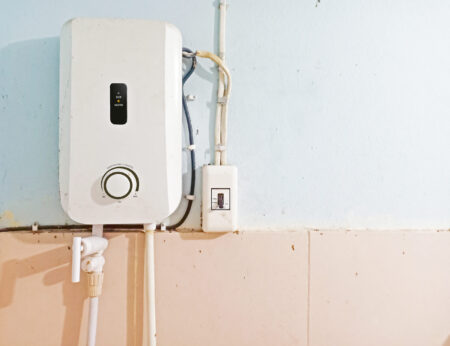What’s The Difference Between Tankless And Traditional Water Heaters?

Tank water heaters are the traditional water heating solution. Americans have been relying on them for hot water in their homes for more than 100 years, but many homeowners are now making the switch to a tankless system. Is it the right choice for you? Let’s answer that by exploring the big differences between a conventional storage water heater and an on-demand water heating system.
What Is a Tank Water Heater?
A tank water heater stores and heats water in a storage tank. The typical capacity is between 40 and 50 gallons. Systems with tanks as large as 100 gallons and as small as 20 gallons are readily available. All residential units will have a lower heating element. Many will have an additional upper element. All systems have an anode rod. It attracts minerals and corrosion in order to protect the tank. You can also opt for a glass-lined tank to further protect against corrosion. Some storage water heaters have an anti-scale device that provides additional protection against limescale, calcium, and so forth.
What Is a Tankless Water Heater?
A tankless water heater does not store hot water and does not have a tank. Instead, it heats the water you need on demand. Like a traditional system, it has a heating element. That heat exchanger transfers heat energy quickly and efficiently to water as it passes through. The advantage here is that you have a virtually unlimited hot water supply. When a tank water heater runs out of hot water, you have to wait for it to reheat the supply, but these systems can be better at handling periods of high demand. Four showers at once are no problem for a traditional heater but can be for a tankless system.
Hot Water Delay
There is always some delay between turning a handle and getting hot water from a faucet. This is true of both tank and tankless systems. Tank systems do take a bit longer because they have to turn on, but the difference here is typically just a second or two. If there is a delay of 10 seconds or longer, there is a problem elsewhere in the plumbing system.
Fuel Sources
There are both electric tank and tankless water heater systems. You have the option of a fuel-based system in both cases as well. That includes natural gas, fuel oil, and propane. If you opt for gas, you have the choice of a high-efficiency condensing model with both tank and tankless systems.
Water Source
All types of water heaters work fine with municipal water supplies. There is a common misconception that on-demand systems are not suitable for wells. This is not true, but there may be some additional considerations. Well water is generally hard. Hard water can affect an on-demand water heater’s efficiency and lifespan. You’ll likely want to install a point-of-entry water softening system. The other issue is that you may not have hot water during a power outage. You can just live with this occasional inconvenience or invest in a battery backup pump.
Sizing the Water Heater
Sizing a tank water heater is generally simpler. The EPA and various plumbing trade associations publish per-person guidelines. Simply multiply the recommendation by the number of people in the home. You can oversize a tank, such as to accommodate guests, but that’s often not recommended. It adds to your energy costs year-round and not just when the guests are present.
Choosing the right tankless water heater is about determining the gallons per minute you need. You also need to determine the maximum number of fixtures that you can run simultaneously. A 3.5 GMP system can handle two simultaneous fixtures. A 5 GPM unit can handle three, and a 7 GPM can handle four. You can choose a higher GPM than you need on a daily basis. It will cost you more upfront, but the additional operating cost will only be present when actually using the higher volume.
Physical Footprint
Tankless systems have a much smaller physical footprint and are easily mounted on a wall. Many homeowners opt to have them in the attic so that the unit is out of sight. Tank water heaters are much bigger and often require a dedicated space. If you’re installing in a garage, you can opt for a tall tank that takes advantage of the higher ceiling. If your water heater closet is small, there are tanks available that are shorter and wider.
Installation and Initial Cost
Tank water heater installation is generally faster and less expensive. With a tankless system, both the equipment and labor are more expensive. You may spend twice as much. There can also be some unexpected costs when converting to an on-demand system. Some homes, for instance, may require an upgrade to the electrical panel to support the new unit.
Lifespan, Warranty, and Total Cost
The general industry recommendation is that you replace a tank water heater in the eight- to 10-year window. The industry recommendation for a tankless system is between years 15 and 20. A tankless system will typically have a lower total cost. Standard warranties tend to be better with tankless systems. You can get a 12-year warranty for a tank system, but you’ll pay for it. You can get a 25-year warranty for a tankless system and will pay a lower premium relative to the total price.
Energy Efficiency and Month-to-Month Costs
Energy efficiency is where the real savings are for a tankless system. The problem with a tank system is that it’s constantly losing heat energy and needing to reheat the water. This is a significant amount of wasted energy over the life of the equipment. With an on-demand system, you only pay for the energy you’re actually using. The average home will save about $100 in water heating costs a year.
Maintenance Requirements
Many homeowners don’t realize tank water heaters require maintenance. But you should have a plumber clean, drain, and flush your system at least once a year. Some industry experts recommend doing it twice a year. That said, on-demand systems do require more maintenance. They need regular flushing as well. Your plumber will have to replace or clean the filter annually. Descaling is necessary too, and frequency depends on how hard your water is.
Energy Star and the Federal Tax Credit
The EPA certifies both gas tank and tankless water heaters through the Energy Star program. Choosing an Energy Star water heater can make you eligible for the federal tax credit. In both cases, the percentage of the project cost and upper limit are the same. But since the tankless system costs more, you’ll be able to claim a bigger credit.
Water Heater Installation in Greater Metro Detroit
C & C Heating & Air Conditioning has installed water heaters in Detroit and the surrounding areas for more than 75 years. Our HVAC technicians install, service, and repair all types of ducted and ductless heating and cooling systems. We install and program smart thermostats. Our team also includes indoor air quality experts who clean ducts and install air purifiers, dehumidifiers, and humidifiers. Call us today or contact us online to schedule a consultation or appointment or with any further questions.





